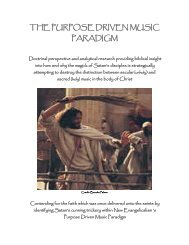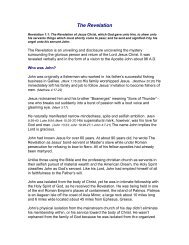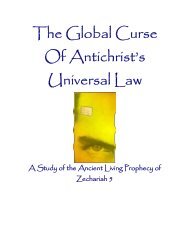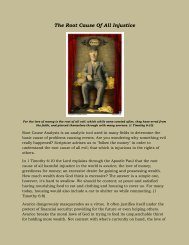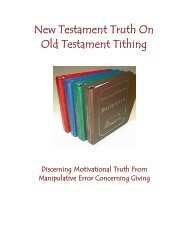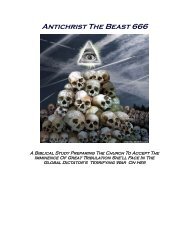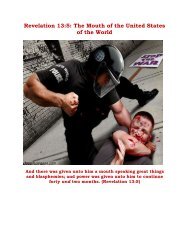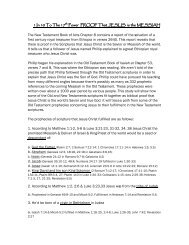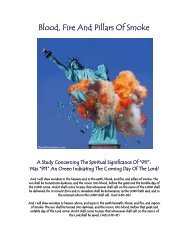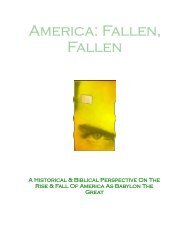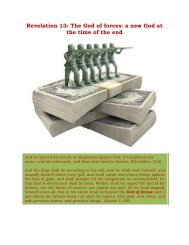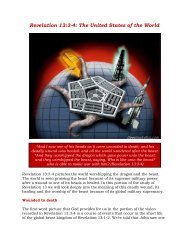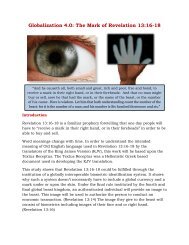Mystery, Babylon The Great (2005) - Escape Babylon's Demons
Mystery, Babylon The Great (2005) - Escape Babylon's Demons
Mystery, Babylon The Great (2005) - Escape Babylon's Demons
Create successful ePaper yourself
Turn your PDF publications into a flip-book with our unique Google optimized e-Paper software.
writes:<br />
(AINA) -- <strong>The</strong> importance of Middle East to the United States rose significantly in 1980 after the Oil<br />
embargo of 1973. <strong>The</strong> then ensuing events, rise of fundamentalism, turmoil, and widespread<br />
kidnappings, urged United States strategists to reevaluate its foreign policy and to place Middle East<br />
under direct military control after Britain decided to leave the region.<br />
To fill the vacuum, United States strategists also considered a number of policy alternatives such as<br />
the Persian Gulf, Suez Canal, and the Northern Tier states. <strong>The</strong> spot most acceptable to them was Oil<br />
rich Saudi Arabia, which is adjacent to the Persian Gulf a nd to the shipping lanes that are vital to<br />
United States commerce. <strong>The</strong> scenario displayed in the Region and executed in the Gulf ; i.e. the<br />
Desert Storm, was in fact launched to achieve such objectives that were beyond the liberation of<br />
Kuwait. <strong>The</strong>se objectives were:<br />
a military base in Gulf area<br />
a Central Command headquarters<br />
a long term responsibility of maintaining the status-quo in post cold-war era.<br />
<strong>The</strong> relaxation of international relations in the wake of Soviet Union disintegration, the collapse of<br />
balance of power theory that overwhelmed the bipolar world, and the emergence of the New Order<br />
with a uni-polar system under the U. S., created a new version of relations characterized by the<br />
following:<br />
Politically<br />
A new law-abiding international system.<br />
<strong>The</strong> return to the United Nations and regional organizations to thwart crisis, diffuse quarrels,<br />
and enforce peace.<br />
<strong>The</strong> use of coalitions to police the world when thwarting fails or does not work.<br />
Economically<br />
Monopoly and control by the United States over world fortunes due to its huge economy and<br />
military strength.<br />
Equal treatment of all nations in a world of free and open markets.<br />
In light of these developments, all countries have to share in the promotion of trade, remove barriers<br />
to world commerce, and encourage investments that lead to the preservation and continuation of<br />
global capitalism as well as the coordination of the interests of all nations in open markets without<br />
ideological competition or class struggle. <strong>The</strong> New World Order emerge d as a new version of the<br />
traditional capitalist system but with a different agenda compatible with the interests of the United<br />
States. Desert Storm, therefore, was launched as a means to protect United States strategic<br />
interests in the Region under the pretext of liberating Kuwait as per United Nations Resolution 678.<br />
In the aftermath of Desert Storm, three events transpired as follows:<br />
<strong>The</strong> Iraqi Army was expelled from Kuwait.<br />
Iraq was deprived of fatal weapons and its arsenal reduced, rendering it inca pable of<br />
intimidating and threatening its neighbors.<br />
<strong>The</strong> United States signed a military treaty with Kuwait and assumed the position of Guardian<br />
of peace in the Middle East.<br />
Prior to Desert Storm U. S. strategists considered two vital issues: how could the U.S. integrate the<br />
Middle East and especially the strategic Iraq within the global economy in New World Order, and by<br />
what means could the U.S. annex the Middle East and Iraq as integral parts of its global military



